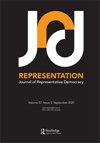信任特拉斯:保守党议员在2022年英国保守党领袖选举中的投票偏好
Q2 Social Sciences
引用次数: 1
摘要
本文章由计算机程序翻译,如有差异,请以英文原文为准。
Trusting Truss: Conservative MPs’ Voting Preferences in the (First) British Conservative Party Leadership Election of 2022
ABSTRACT This paper identifies the candidate preferences of Conservative parliamentarians in the final parliamentary ballot and the membership ballot of the Conservative Party leadership election of 2022. We code each parliamentarians’ candidate preference within a wider dataset on the parliamentary Conservative Party (PCP) and test a range of hypotheses covering the following: a). personal factors relating to gender, sexuality, ethnicity and education b). political factors, relating to constituency marginality and type, as well as prior support for Johnson, and c). ideological factors, covering for example, attitudes towards Brexit, cultural debates, levelling up, economic liberalism, net zero and Covid restrictions. Our research findings demonstrate that despite common media narratives at the time of the party leadership election, variables capturing loyalty or opposition to Johnson did not structure patterns of support for candidates in either round. A parliamentarian's position on levelling up, as well as the UK's membership of, and relationship with, the European Union (based on whether they were remainers, leavers, or a member of the European Research Group) were more important in structuring support. However broader measures of ideology, as evidenced through the membership of extra-parliamentary groups, was found not to be important.
求助全文
通过发布文献求助,成功后即可免费获取论文全文。
去求助
来源期刊

Representation
Social Sciences-Sociology and Political Science
CiteScore
3.50
自引率
0.00%
发文量
31
期刊介绍:
This change in scope follows two paths. Firstly, it seeks contributors who are interested in exploring the interface between democratic practice and theory. In particular, this focus seeks contributions that apply theoretical insights to actual examples of current practice. Secondly, while not neglecting the current focus of the journal, we would like to expand its international coverage so that the journal will offer our readers insights in the state of democracy worldwide.
 求助内容:
求助内容: 应助结果提醒方式:
应助结果提醒方式:


